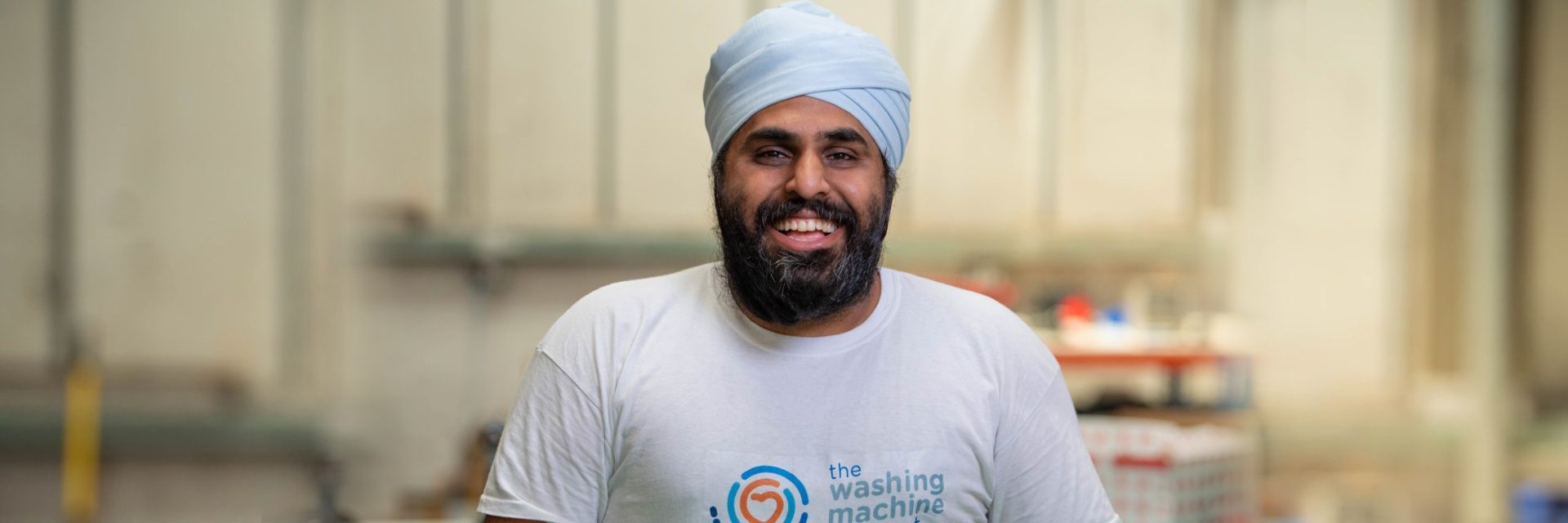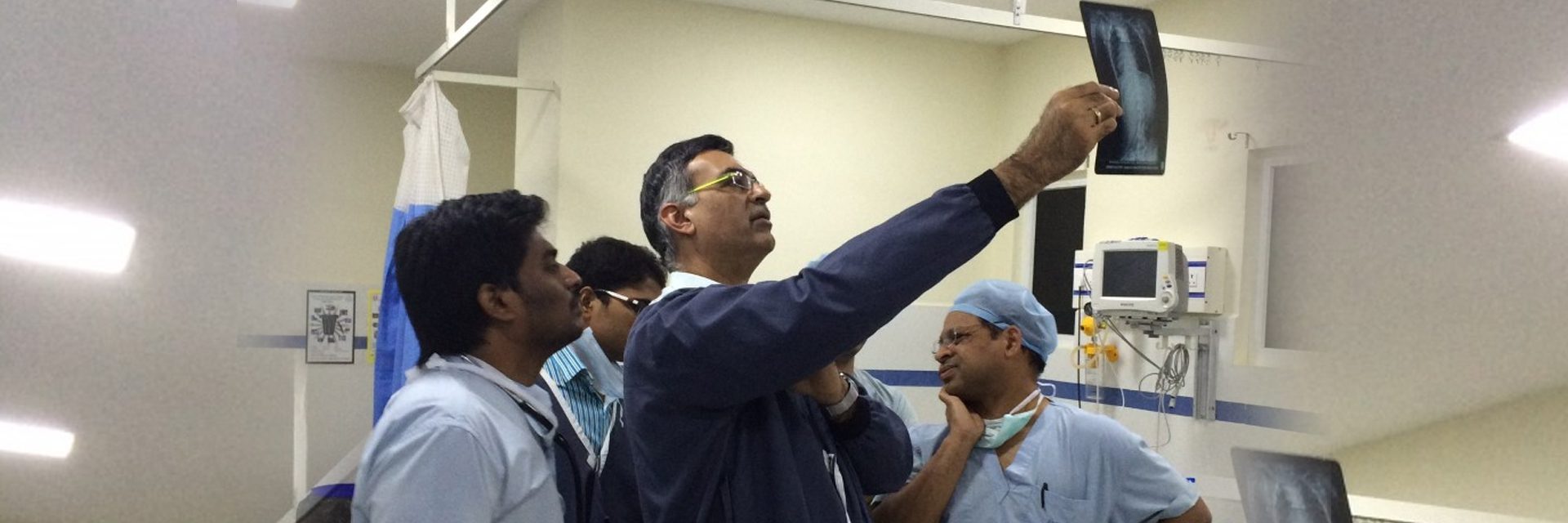(February 8, 2022) “Divya” gave Navjot Sawhney purpose. In Kuilapalayam in Tamil Nadu, a British-Sikh engineer met an effervescent neighbour, Divya. Little did Navjot know that this 30-something woman was to change the course of his life, and add meaning with the launch of The Washing Machine Project. “During my stay, I met Divya, who spent her day doing unpaid labour. Washing clothes took the most time, leading to backache and skin irritation. I knew I had to do something to help women like Divya,” Navjot tells Global Indian.
That watershed moment gave way to The Washing Machine Project that’s now supplying over 7,000 low-cost manual washing machines, helping women across 10 countries like Iraq, Lebanon and Uganda. “By providing accessible and off-grid washing solutions, we aim to empower women with the time to take charge of their lives,” smiles Navjot. The British-Sikh engineer’s project has won the Campaign of the Year at Elektra Awards, and was selected as a Top 10 finalist at the SantanderX Global Awards.

A London boy with a giving heart
Born in West London in 1990 to an aerospace engineer father and an assistant mother, Navjot was a curious child. “My father would often take me to air shows. I’d be fascinated by the big objects in the sky. I’d come home, take my toolbox and dismantle appliances. I was keen to know what’s inside. That curiosity helped me broaden my imagination, and took me into the direction of engineering,” says Sawhney. Joining the scouts as a child grew this British-Sikh engineer’s sense of community. “It was then that I learnt the importance of community and giving back – those important lessons inspire me,” he adds.
It’s that same sense of purpose which made Navjot quit his high-paying job at Dyson (research engineer) to help the marginalised. After graduation at Queen Mary University of London (aerospace, aeronautical, and astronautical engineering), Navjot has his dream job – making products. Three years later, it dawned upon him that “every good bit of engineering is giving a product to the middle class or rich who already has it.” That “epiphany” made him introspect. “I knew I had the skillset and wanted to dedicate my engineering to helping people,” adds Navjot, who began working with Engineers Without Borders UK despite resistance from his mother. “It was one of my most difficult decisions as almost everyone was against it, including my mom. I asked her to give me a year,” recalls the British-Sikh engineer-innovator, who went to Kuilapalayam to help install fuel-efficient stoves with Prakti.

Nervous, he was ready to give up and return to the UK in the first few days due to frequent power cuts. “It was a culture shock and adjusting was taking a toll. I wanted to get back to my comfort zone. I am glad that I got over that phase quickly,” adds the Londoner, who witnessed India’s problems – sanitation, abject poverty, systemic issues in education, etc.
Prototypes from a British-Sikh engineer save time
For the next year, the British-Sikh engineer threw himself into making stove prototypes, with innovation. When he befriended Divya, an idea germinated. “She married early, had two children, and spent three hours washing clothes that led to skin irritation and backache. Despite being educated, she missed the earning opportunities due to the time-consuming activity. At times, even her daughter missed school to wash clothes,” reveals Navjot, who wanted to help women like Divya. “Handwashing clothes is crippling and back-breaking in rural areas as women carry water from ponds. I spoke to women, they felt they couldn’t afford electric washing machines. That’s when the penny dropped,” says the 31-year-old.

Navjot Sawhney with neighbour Divya
He promised to make a manual washing machine but his time in India had come to an end. Back in the UK, he started work at Jaguar Land Rover (senior cost engineer). “A few months into the job, I started The Washing Machine Project in 2018 with a handful of engineer friends,” states Navjot, who had researched and identified the problem of washing clothes in 13 countries including Jordan, Uganda and the Philippines where they spent up to 20 hours a week on washing. The British-Sikh engineer was inspired.
Creating a foundation
At the same time, he enrolled at University of Bath (M.Sc in humanitarianism) to unlock a social network and capital to the industry. “A classmate knew about The Washing Machine Project, and invited us to Iraq to show our prototype. Based on a salad spinner model, I built the prototype in two days. We interviewed 70 families at the Mamrashan Refugee Camp in Iraq, realised that 88 percent wanted and needed a machine. We published a report on our website – Oxfam read it, contacted us to pilot 50 machines. They funded us, and that is how we made our first manual machine in 2019 which we named Divya 1.5,” reveals Navjot.

Navjot Sawhney in Iraq for a research trip
The hand-operated machine has a 5 kg drum capacity, and comes with a washer and a spin dryer that is 75 percent faster than the hand washing. “You put all the clothes inside the drum, and turn the wheel manually. It saves time and water, and is not dependent on electricity,” adds Navjot, who has already sent 7,000 machines to 10 countries with plans to expand.
In terms of funding, a few agencies buy, or the machines are given free of cost to the needy. “We also have corporate partners. The machine is also commercially available on our website,” says the British-Sikh engineer, who has priced the machine at £50 (₹5,000).
While his friend Divya is yet to receive the machine due to technical challenges owing to the pandemic, Navjot has spread his wings to refugee camps in Lebanon, Jordan and Uganda. “Displacement is an issue close to my heart. My grandparents struggled during the partition, and my father was a refugee. So, I understand the struggles of uprooting yourself and making a new place home,” explains Navjot, who is currently in Lebanon on research.

A woman with Divya 1.5
British-Sikh engineer’s idea that can save time
What began as a mission to design, develop and manufacture an affordable machine has now translated into something bigger. Navjot wants The Washing Machine Project to become the Dyson of the humanitarian world by creating cost-efficient products that help the needy. “As a board trustee of Engineers Without Borders UK, it’s my mission to make the next generation of engineers create an impact, and understand the importance of innovation for women like Divya,” says the British-Sikh engineer, who interacts with 3,000 students.
“To have the credibility and confidence in people to believe in what you are doing was one of the biggest challenges. Slowly, our work started getting recognised. For me, the happy moments have been the smiles on faces when they get the machine and experience the solution,” adds the British-Sikh engineer. Navjot plans to expand the project to 24 countries. Currently manufacturing in the UK, the plan is to shift manufacturing to India to ramp up production and save time.
Navjot unwinds by spending time with family. The stark reality of refugee camps has made him appreciate family time, especially with his two elder sisters. “I was seven when I lost my father and it was a difficult time. I was surrounded by women who nurtured and supported me. The power of the women in the house is phenomenal,” says Navjot, who is proud to be brought up by the women brigade, thus more empathetic.
- Follow Navjot Sawhney on Linkedin


